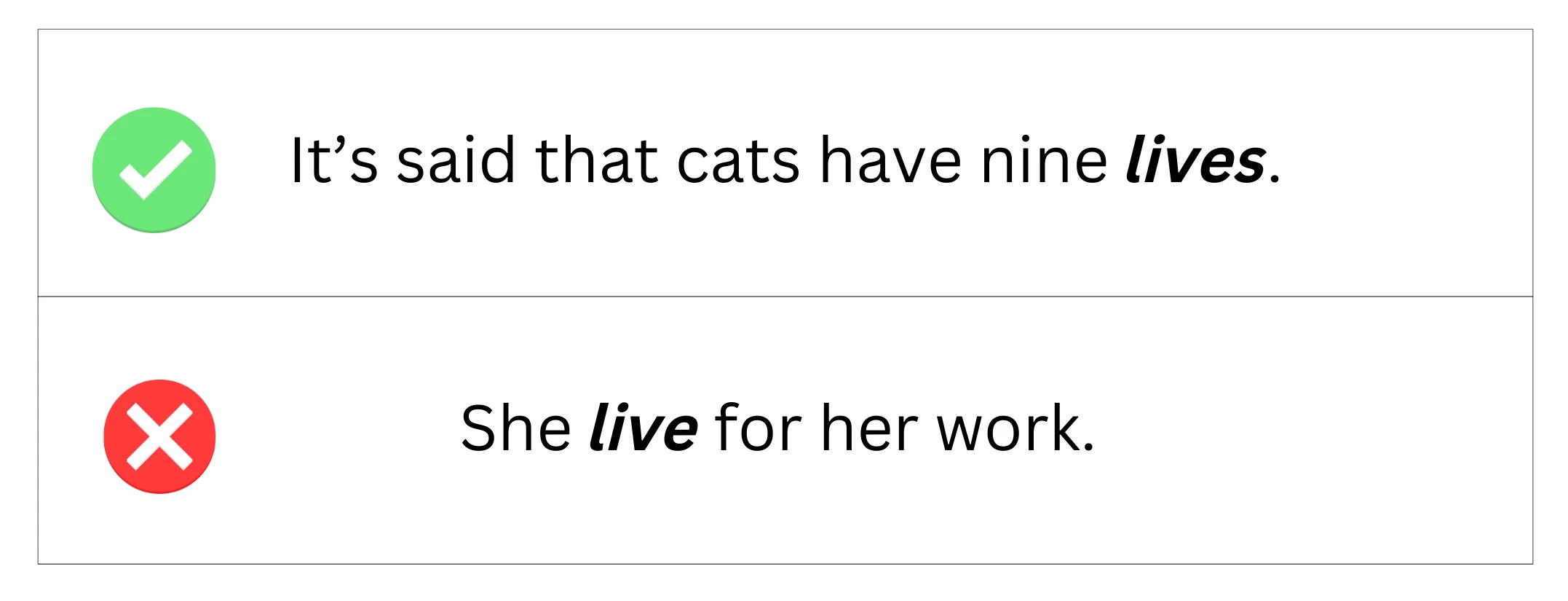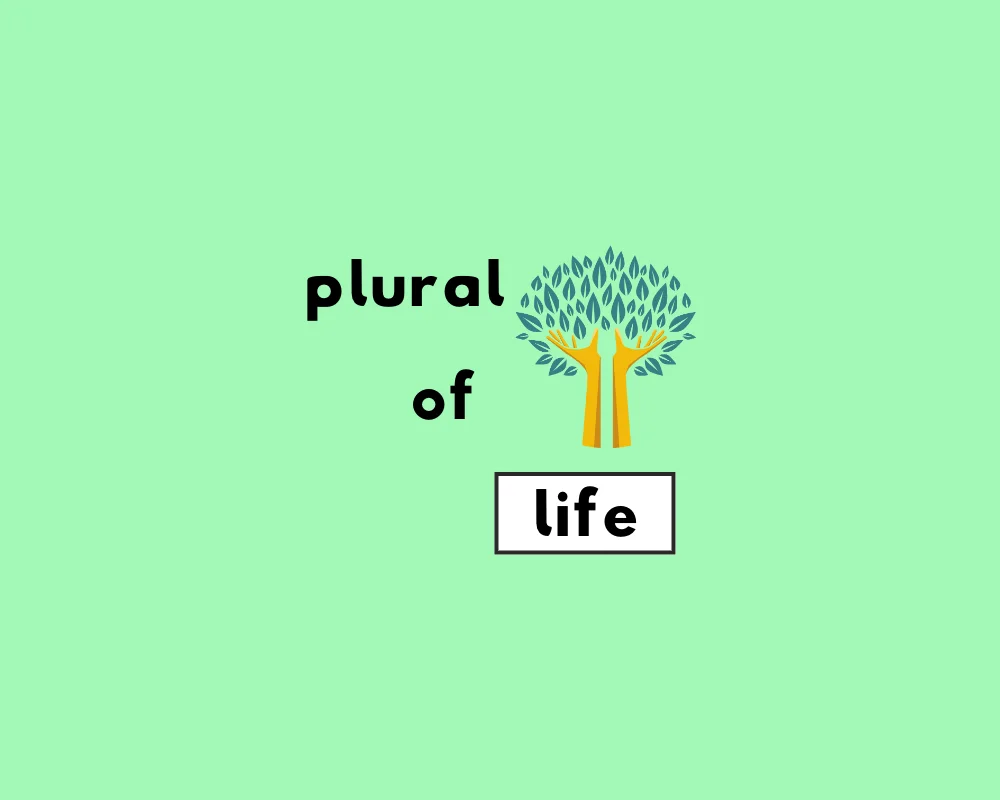What’s the plural of “life”?
A cat has nine lives.
She lives in the city center.
They risked their own live to save others.
The book describes the interesting lives of the protagonist.
Life is a noun, and the correct plural is lives. Lives can also be a verb, which can be literally understood as the act of living this so-called life. Lives is also the third-person singular form of live. This admittedly sounds confusing, but it’s really not. The difference is in the parts of speech both words belong to, and their pronunciation.
Life refers to the state of existence (or being alive), or the period between birth and death. This is how the noun form of life, which sounds like lyfe, is used. The verb form of life is live (which sounds like liv as in olive). Lives is the plural of the singular noun life, but lives is also how you can refer to the third-person singular of the verb live. The correct context in which you should use the verb form vs. the noun form of lives is clear in practice and speech. See these sentences:
He lives on third street.
A cat has nine lives.
See the difference? Lives as a noun refers to multiple lives in a literal sense. Lives in the third-person singular mentions a specific person that is actually performing the action of the verb live.

Lifes or lives?
Lifes is incorrect, and is not a recognized word in English. But, were it to appear, it should include an apostrophe, i.e., life’s. This shows that it’s either a possessive noun or contracted form of life + is. Here’s the difference:
Her life’s goal was to become a famous novelist.
Life’s too short to spend doing what you don’t love.
What’s the definition of life?
The online dictionary defines a life as:
The condition that distinguishes organisms from inorganic objects and dead organisms, being manifested by growth through metabolism, reproduction, and the power of adaptation to environment through changes originating internally.
What’s the plural of life? Why is lives the plural of life?
Lives is irregular, even though it ends in the regular plural –es suffix. Lives is still irregular because most plural nouns do not go through such a dramatic transformation between the singular and plural: lions, and tigers, and bears are perfect examples. They’re basic, easy plurals; all you have to do is attach the s.
Hold your horses (pl. n.)—English is filled with exceptions, and idiosyncrasies tend to be the norm (especially in the case of plural noun forms … Didn’t intend for the rhyme, but it’s too good to even entertain backspacing.) Back to lives, (which is a plural noun that is spelled and pronounced differently than its singular noun case, life). Lives is not alone in its cohort of irregularity, as will be shown in the section below.
“life’s” plural, associate “lives” with the verb “live”—they sound alike and both relate to the state of being alive.
Nouns that end in -f/-fe modify to –ves
Words like knife, wife, shelf, scarf, wolf, (the list goes on) a different rule applies. Each converts the -f/-fe in its singular case to -ves in plural. See the chart:
| singular | plural |
| knife | knives |
| life | lives |
| wife | wives |
| shelf | shelves |
| self | selves |
| half | halves |
| wolf | wolves |
Origin of the word life
Each of these words, unsurprisingly, share etymology and place of origin. Each came was down to Modern English from the Germanic languages, or PIE (Proto-Indo-European region.) Students of Germanic languages and linguistics are likely familiar with the i-umlaut (a particular favourite on the #GFlex blog.)
The i-umlaut, (which is another Germanic way to denote a plural that involves exchanging vowels from sing. to pl. forms) is responsible for the irregular plurals such goose goes to geese; foot to feet, tooth to teeth (but not moose, that stays as moose—it comes from the Algonquian languages.) The i-umlaut describes one method Germanic languages used to denote a plural. Here, the rule that applies in the case of singular nouns that end in -f/-fe (sometimes referred to as a sibilants: wolf, knife, wife, life, etc. Each ends in –ves as a plural noun, replacing the sibilant -f/-fe in the singular case.
Examples of life used in context
The following sentences show the correct use of the word life in context. From dictionary.com on the etymology of life:
1. Life, as they say, is good.
2. When a judge passes a life sentence, they must specify the minimum term an offender must spend in prison before becoming eligible to apply for parole (sometimes called the tariff).
3. Here is life, an experiment to a great extent untried by me; but it does not avail me that they have tried it.
4. We only have one life.
5. You can’t spend your life terrified to leave the house alone.
6. Everyone’s life is valuable.
Examples of the word lives in sentences:
The following sentences show the correct use of lives in context:
1. Our lives begin to end the day we become silent about things that matter. (Martin Luther King Jr)
2. Some people never go crazy. What truly horrible lives they must live. (Charles Bukowski)
3. The private lives of the rich and famous.
4. A cat has nine lives.
5. Their lives are as important as other people’s.
Phrases and idioms that use the word life
- The life of the party.
- To put your life on the line.
- Such is life.
- As large as life.
What’s the difference between they’re, their, and there?
Work Sheet
According to the post, what is the correct plural form of the noun “life”?
Which spelling is described in the post as an incorrect plural of “life”?
The post mentions that “lives” can function as both a plural noun and which other part of speech?
In the sentence “A cat has nine lives,” what part of speech is the word “lives”?
Which of the following sentences uses “lives” as the third-person singular form of the verb “live”?
Many people search for the meaning of their .
The post says the brave people risked their own to save others.
She in the city center, as shown in one example.
The book describes the interesting of several historical figures.
too short to spend doing what you don’t love, according to the post.
Frequently Asked Questions
What’s the plural of “life”?
+
Can “lives” be a verb?
+
How to tell noun “lives” from verb “lives”?
+
Is “lifes” the correct plural of “life”?
+
Why is “lives” called irregular?
+
Yash, D. "What’s the Plural of Life?." Grammarflex, Jun 7, 2025, https://www.grammarflex.com/whats-the-plural-of-life/.
Sources
-
Origin of wife.











